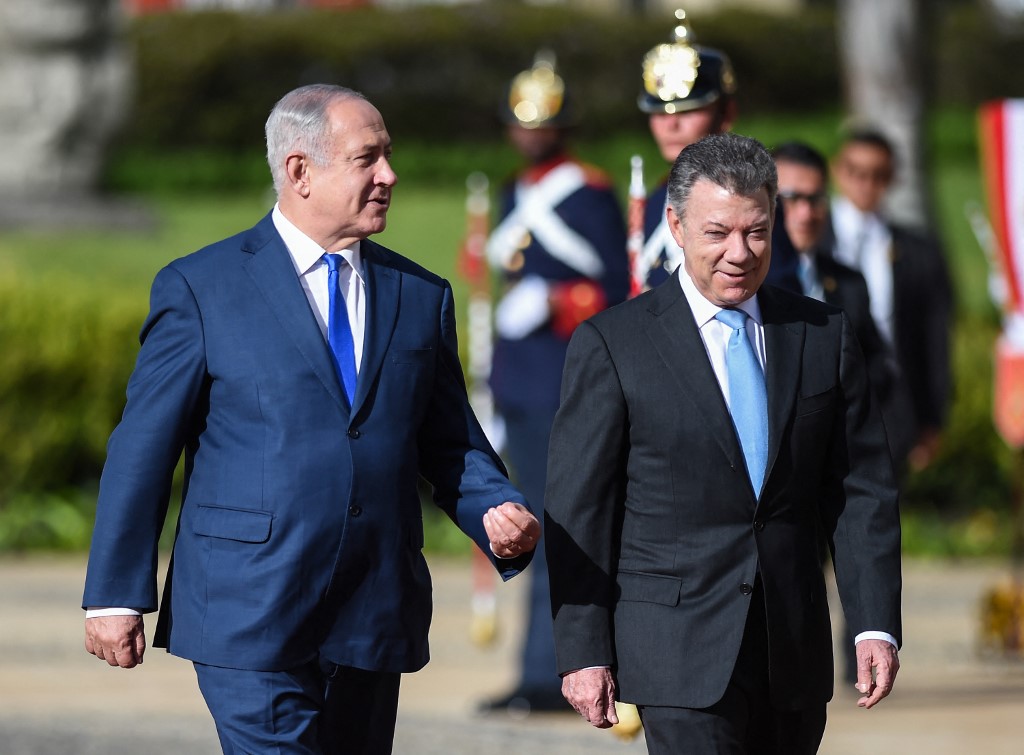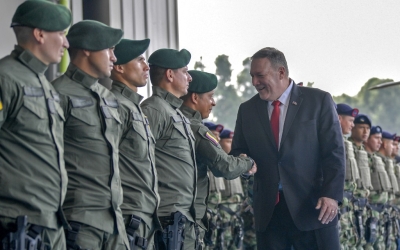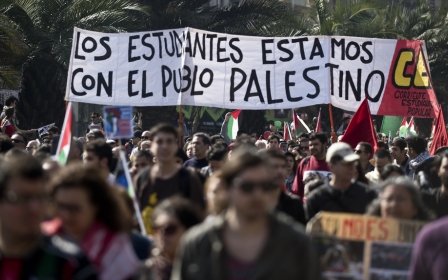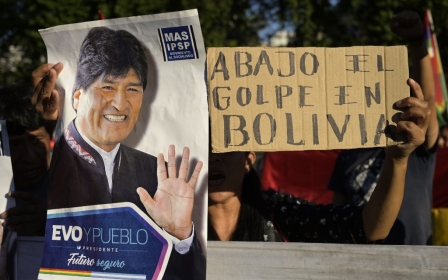Israel and Colombia: The ever more special relationship
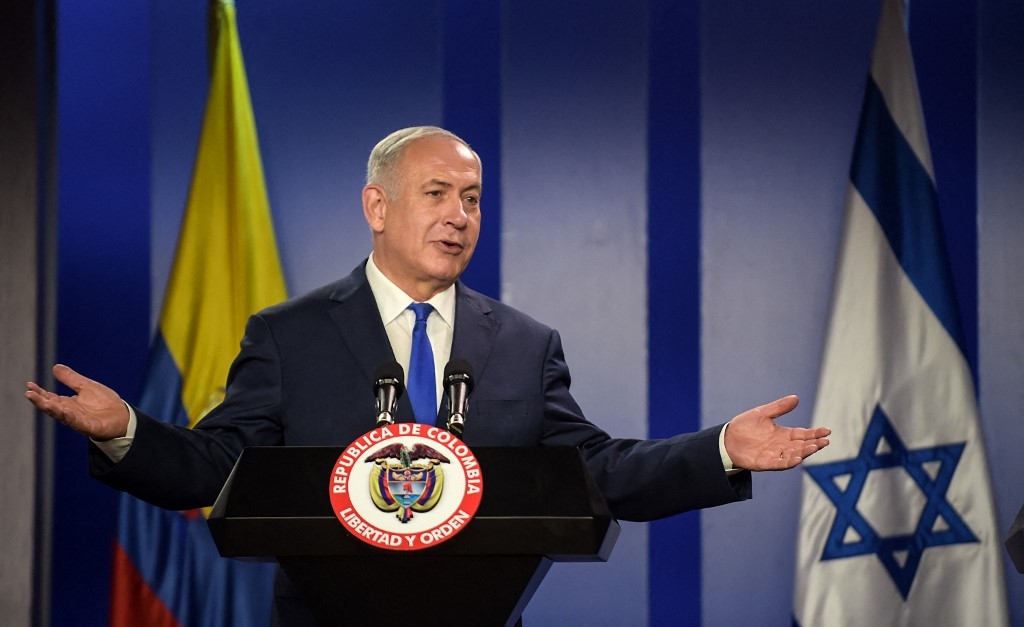
Last August, Israeli Prime Minister Benjamin Netanyahu and Colombian President Ivan Duque held a joint videoconference to launch a new free trade agreement between their countries.
The corresponding media release from Israel’s Ministry of Foreign Affairs noted that the agreement would “create opportunities for the Israeli economy in various fields including agriculture, technology and medicine”.
Duque also committed to opening an “innovation office” in occupied Jerusalem, which was apparently Colombia’s interim solution for kissing the Israeli rear end without irreparably defying Palestinians and international law by suddenly moving the Colombian embassy to Israel’s self-appointed capital.
'Counterterrorism' credentials
The media release quoted Netanyahu as enthusing that the “platform of cooperation” between Israel and Colombia would “bring our partnership, our friendship, our brotherhood … to new political and economic levels”. The prime minister went on to applaud his counterpart: “Ivan, your leadership in the fight against terrorism sets an example for the rest of Latin America.”
Of course, given that Netanyahu’s version of fighting terrorism includes things like slaughtering Palestinians left and right, it’s not difficult to guess at what Duque’s “counterterrorism” credentials might entail. Since the right-wing leader took power in 2018, a surge in massacres has taken place in Colombia - many implicating the government.
The trio in question in this case - the US, Israel and Colombia - has gone about dutifully terrorising populations in the name of fighting terror
Duque has been a staunch opponent of the so-called peace process with the Revolutionary Armed Forces of Colombia (FARC), the left-wing guerrilla movement that emerged in the 1960s in response to the domestic panorama of elite tyranny and asphyxiating injustice.
Although a peace deal was ostensibly concluded in 2016 to put an end to the country’s long-running civil war, “peace” turned out to be more a continuation of business as usual, with the P-word as a fig leaf. Assassinations of human rights activists and the like have proceeded apace - and yet, in Duque’s view, the mere invocation of the word “peace” is apparently anathema, which is perhaps why he and Netanyahu enjoy such a “brotherhood”.
Extrajudicial killings
To be sure, the Israeli-Colombian partnership is nothing new. A dispatch on the BBC’s Spanish website recalled the contention by late Venezuelan President Hugo Chavez, more than a decade ago, that Colombia was the “Israel of Latin America” - a valid assessment, no doubt, in light of shared national habits such as extrajudicial killings and the forced displacement of indigenous communities.
Carlos Castano, a principal force behind the rise of modern Colombian paramilitary formations - whose primary functions include abetting right-wing violence by the state - admitted to copying the paramilitary concept from the Israelis after a training session in Israel in 1983.
Colombia has also long been a privileged collaborator with the Israeli arms industry, and former Colombian President Juan Manuel Santos - Duque’s predecessor - starred in a 2011 promotional video for an Israeli private security firm. This same Santos issued an upbeat response to Chavez’s critique: “We’ve even been accused of being the Israelites [sic] of Latin America, which personally makes me feel really proud.”
Halfway through the BBC article, Santos appears chortling in a photograph with Netanyahu - the caption to which specifies that, both as president and during his previous service as defence minister under Alvaro Uribe, Santos was “one of the main champions of the special relationship”, owing in part to his “friendship” with the Israeli prime minister.
A few paragraphs up, Uribe himself appears grinning in the passenger’s seat of a vehicle being driven by former US President George W Bush. The caption remarks that the US alliance with Colombia in the fight against “terrorism” constituted a positive “turning point” in Israeli-Colombian relations, as well - resulting in a bellicose menage a trois, if you will.
Outer limits of irony
Indeed, the whole "war on terror" has taken us all for a ride. As befits the war’s counter-logic, the trio in question in this case - the US, Israel and Colombia - has gone about dutifully terrorising populations in the name of fighting terror.
Uribe, for example, presided over the “false positives” scandal that reportedly saw the Colombian military kill more than 10,000 civilians and then disguise the cadavers as “terrorist” guerrillas - facilitating bonus pay and other perks for individual soldiers, and validating the gargantuan influx of US military aid.
Santos, who during his stint as defence minister was naturally complicit in the affair, would go on to win a Nobel Peace Prize for his “resolute efforts” to end the Colombian conflict, thereby further testing the outer limits of irony.
Gobs of money have also been flung at the Israeli military, which enjoys the dubious advantage of operating under the effective assumption that all Palestinians are terrorists at heart - meaning that it’s not really even a “scandal” when massacres of civilians regularly occur.
And more good things can only be in store on account of a recent boost in Israeli-Colombian military cooperation. A post last September on the website of the General Command of the Colombian Military Forces announced that Israeli army instructors had been working with Colombian special forces to reinforce "training in counterterrorism and combat techniques”.
Supposedly, Israeli expertise will encourage “the technification [sic] and professionalisation of the National Army” - although this may simply mean that the killing of civilians will become more, you know, technified.
Expecting miracles
Of course, there are also non-military ways of waging war. As Harvard Law School Professor Emeritus Alan Dershowitz - enthusiastic promoter of the legal opinion that it is pretty much okay for Israel to slaughter Arab civilians - has said with regard to the boycott, divestment and sanctions movement for Palestinian rights: “There is no weapon more powerful in the fight against BDS than for Israel to develop technologies that the world cannot live without.”
Dershowitz made this pronouncement at the 2017 annual policy conference of the American Israel Public Affairs Committee, where, as the Times of Israel reported, he took to the stage to “showcase a new Israeli technology that can seemingly create water out of thin air”. Nothing like a bit of spontaneous water to whitewash Israel’s image.
It's key to remember that
right-wing oppression is hardly a thirst-quencher
Earlier this year, the same technology, courtesy of the Israeli firm Watergen, materialised in the Gaza Strip - a humanitarian PR stunt that did nothing to resolve the fact that Israel criminally and systematically deprives Palestinians of water. Netanyahu himself has performed PR for Watergen, and Israel’s former UN ambassador equated the company’s technology with a biblical miracle.
And what do you know: a 12 March Jerusalem Post article trumpets the news that an “Israeli company making water from thin air” has come to the rescue of the Colombian department of La Guajira. Many more such miracles can presumably be expected.
Back in 2015, Erez Zaionce, the head of Israel’s economic and trade mission to Colombia, stated that “Colombia’s local market is developed and ‘thirsty’ for Israeli innovation”. Now, as the Israeli-Colombian “brotherhood” forges ahead and the bilateral relationship becomes ever more special, it’s key to remember that right-wing oppression is hardly a thirst-quencher.
The views expressed in this article belong to the author and do not necessarily reflect the editorial policy of Middle East Eye.
Middle East Eye propose une couverture et une analyse indépendantes et incomparables du Moyen-Orient, de l’Afrique du Nord et d’autres régions du monde. Pour en savoir plus sur la reprise de ce contenu et les frais qui s’appliquent, veuillez remplir ce formulaire [en anglais]. Pour en savoir plus sur MEE, cliquez ici [en anglais].



